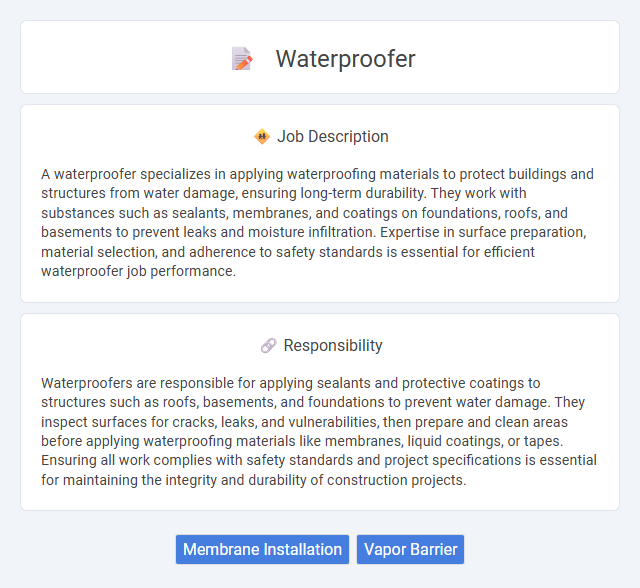
A waterproofer specializes in applying waterproofing materials to protect buildings and structures from water damage, ensuring long-term durability. They work with substances such as sealants, membranes, and coatings on foundations, roofs, and basements to prevent leaks and moisture infiltration. Expertise in surface preparation, material selection, and adherence to safety standards is essential for efficient waterproofer job performance.
Waterproofer jobs may be suitable for individuals who are physically fit and comfortable working in potentially damp, confined, and outdoor environments. Those with a tolerance for repetitive tasks, attention to detail, and the ability to work with various waterproofing materials might find the role fitting. People with respiratory issues or sensitivity to chemicals could face challenges and may not be ideal candidates for this type of work.
Qualification
A Waterproofer must have a strong understanding of waterproofing materials, surface preparation, and application techniques to prevent water infiltration in buildings and structures. Essential qualifications include experience with waterproofing membranes, sealants, and coatings, along with knowledge of safety regulations and construction standards. Proficiency in interpreting blueprints and technical drawings enhances precision and effectiveness in project execution.
Responsibility
Waterproofers are responsible for applying sealants and protective coatings to structures such as roofs, basements, and foundations to prevent water damage. They inspect surfaces for cracks, leaks, and vulnerabilities, then prepare and clean areas before applying waterproofing materials like membranes, liquid coatings, or tapes. Ensuring all work complies with safety standards and project specifications is essential for maintaining the integrity and durability of construction projects.
Benefit
Waterproofer jobs likely offer the benefit of steady demand in construction and repair projects, suggesting consistent employment opportunities. Workers in this role may experience improved job security due to the specialized skill set required to prevent water damage. There is a possibility of earning competitive wages, especially with increased experience and expertise in various waterproofing techniques.
Challenge
Waterproofer jobs likely present challenges related to accurately assessing surfaces for hidden cracks and moisture infiltration. The probability of encountering varying environmental conditions may complicate the application process, requiring adaptability and precise technique. Success in this role often depends on problem-solving skills to ensure long-lasting, effective waterproofing solutions.
Career Advancement
Waterproofer professionals gain expertise in applying sealants and waterproof membranes to protect structures from moisture damage, enhancing their skill set with advanced techniques and materials. Career advancement opportunities include roles such as project supervisor, quality control inspector, or specialist in high-tech waterproofing systems for commercial and residential developments. Continuous training and certifications in new waterproofing technologies significantly increase job prospects and earning potential in construction and maintenance industries.
Key Terms
Membrane Installation
Waterproofer specialists excel in membrane installation, ensuring structures remain impervious to water infiltration by applying advanced waterproofing membranes such as bituminous, EPDM, and liquid-applied membranes. Their expertise involves surface preparation, precise application techniques, and thorough quality inspections to guarantee watertight seals in basements, roofs, and foundations. Mastery of membrane installation significantly enhances building durability, preventing moisture damage and costly structural repairs.
Vapor Barrier
A Waterproofer specializing in vapor barrier installation plays a critical role in protecting buildings from moisture infiltration by applying specialized membranes that prevent vapor diffusion. Expertise in selecting and installing high-quality vapor barrier materials, such as polyethylene sheets or liquid-applied membranes, ensures the longevity and structural integrity of foundations, basements, and crawl spaces. Proper vapor barrier installation minimizes mold growth, reduces moisture-related damage, and enhances indoor air quality by controlling humidity levels within structures.
 kuljobs.com
kuljobs.com